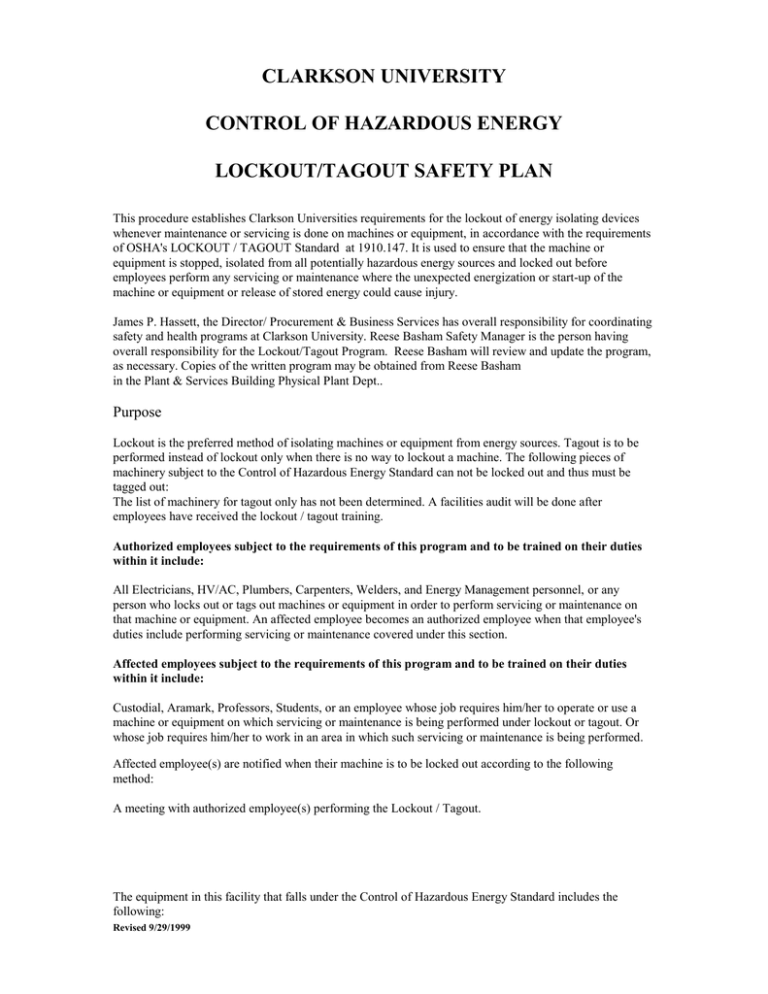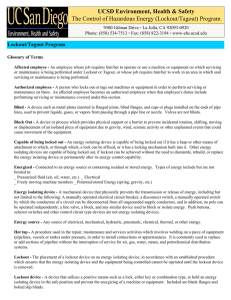CLARKSON UNIVERSITY CONTROL OF HAZARDOUS ENERGY LOCKOUT/TAGOUT SAFETY PLAN
advertisement

CLARKSON UNIVERSITY CONTROL OF HAZARDOUS ENERGY LOCKOUT/TAGOUT SAFETY PLAN This procedure establishes Clarkson Universities requirements for the lockout of energy isolating devices whenever maintenance or servicing is done on machines or equipment, in accordance with the requirements of OSHA's LOCKOUT / TAGOUT Standard at 1910.147. It is used to ensure that the machine or equipment is stopped, isolated from all potentially hazardous energy sources and locked out before employees perform any servicing or maintenance where the unexpected energization or start-up of the machine or equipment or release of stored energy could cause injury. James P. Hassett, the Director/ Procurement & Business Services has overall responsibility for coordinating safety and health programs at Clarkson University. Reese Basham Safety Manager is the person having overall responsibility for the Lockout/Tagout Program. Reese Basham will review and update the program, as necessary. Copies of the written program may be obtained from Reese Basham in the Plant & Services Building Physical Plant Dept.. Purpose Lockout is the preferred method of isolating machines or equipment from energy sources. Tagout is to be performed instead of lockout only when there is no way to lockout a machine. The following pieces of machinery subject to the Control of Hazardous Energy Standard can not be locked out and thus must be tagged out: The list of machinery for tagout only has not been determined. A facilities audit will be done after employees have received the lockout / tagout training. Authorized employees subject to the requirements of this program and to be trained on their duties within it include: All Electricians, HV/AC, Plumbers, Carpenters, Welders, and Energy Management personnel, or any person who locks out or tags out machines or equipment in order to perform servicing or maintenance on that machine or equipment. An affected employee becomes an authorized employee when that employee's duties include performing servicing or maintenance covered under this section. Affected employees subject to the requirements of this program and to be trained on their duties within it include: Custodial, Aramark, Professors, Students, or an employee whose job requires him/her to operate or use a machine or equipment on which servicing or maintenance is being performed under lockout or tagout. Or whose job requires him/her to work in an area in which such servicing or maintenance is being performed. Affected employee(s) are notified when their machine is to be locked out according to the following method: A meeting with authorized employee(s) performing the Lockout / Tagout. The equipment in this facility that falls under the Control of Hazardous Energy Standard includes the following: Revised 9/29/1999 Transformers, Boilers, Auto Hoist, Co Generators, Emergency Generators, Air Compressors, Vacuum Pumps, Air Handling Equipment, Refrigerating & Air Conditioning Equipment, Elevators, Fluid Handling Equipment, Shop Tools (Wood) The machinery listed above follows these shutdown, isolation, blocking and securing procedures for lockout/tagout: 1. Shut down all equipment and/ or secondary loads 2. Disconnect energy source and lockout/ tagout 3. Confirm equipment has been deenergized 4. Drain all stored energy 5. Notify all effected people 6. Perform work assignment The machinery listed above follows these lockout placement, removal, transfer, and responsibility procedures: Lockout or tagout device application are as follows: * Lockout or tagout devices shall be affixed to each energy isolating device by authorized employees. * Lockout devices, where used, shall be affixed in a manner that will hold the energy isolating devices in a "safe" or "off" position. * Tagout devices, where used, shall be affixed in such a manner as will clearly indicate that the operation or movement of energy isolating devices from the "safe" or "off" position is prohibited. Where tagout devices are used with energy isolating devices designed with the capability of being locked, the tag attachment shall be fastened at the same point at which the lock would have been attached. Where a tag cannot be affixed directly to the energy isolating device, the tag shall be located as close as safely possible to the device, in a position that will be immediately obvious to anyone attempting to operate the device. Stored energy. Following the application of lockout or tagout devices to energy isolating devices, all potentially hazardous stored or residual energy shall be relieved, disconnected, restrained, and otherwise rendered safe. (ii) If there is a possibility of reaccumulation of stored energy to a hazardous level, verification of isolation shall be continued until the servicing or maintenance is completed, or until the possibility of such accumulation no longer exists. Verification of isolation. Prior to starting work on machines or equipment that have been locked out or tagged out, the authorized employee shall verify that isolation and deenergization of the machine or equipment have been accomplished, even though isolation is performed prior to shutdown and is checked at that point. Release from lockout or tagout. Revised 9/29/1999 Before lockout or tagout devices are removed and energy is restored to the machine or equipment. The following procedures shall be followed and actions taken by the authorized employee(s) to ensure the following: * The machine or equipment. The work area shall be inspected to ensure that nonessential items have been removed and to ensure that machine or equipment components are operationally intact. * Employees. The work area shall be checked to ensure that all employees have been safely positioned or removed. * After lockout or tagout devices have been removed and before a machine or equipment is started, affected employees shall be notified that the lockout or tagout device(s) have been removed. Lockout or tagout devices removal. Each lockout or tagout device shall be removed from each energy isolating device by the employee who applied the device. Exception: When the authorized employee who applied the lockout or tagout device is not available to remove it, that device may be removed under the direction of the employer, provided that specific procedures and training for such removal have been developed, documented and incorporated into the employer's energy control program. The employer shall demonstrate that the specific procedure provides equivalent safety to the removal of the device by the authorized employee who applied it. The specific procedure shall include at least the following elements: * Verification by the employer that the authorized employee who applied the device is not at the facility; * Making all the reasonable efforts to contact the authorized employee to inform him/her that his/her lockout or tagout device has been removed; * Ensuring that the authorized employee has this knowledge before he/she resumes work at that facility. In situations in which lockout or tagout devices must be temporarily removed from the energy isolating device and the machine or equipment energized to test or position the machine, equipment or component thereof, the following sequence of actions shall be followed: 1. Clear the machine or equipment of tools and materials; 2. Remove employees from the machine or equipment area; 3. Remove the lockout or tagout devices; 4. Energize and proceed with testing or positioning; 5. Deenergize all systems and reapply energy control measures in accordance with the Control of Hazardous Energy Standard to continue the servicing and/or maintenance. Periodic Inspection: At least once a year there will be periodic inspections completed of lockout / tagout procedures for shutdown of machinery. CLARKSON UNIVERSITY REMOVAL OR DEFEATING OF LOCKOUT / TAGOUT DEVICES PROCEDURE Revised 9/29/1999 The only acceptable procedure to defeating or removing a lockout / tagout device is by cutting the padlock , or cutting the fastening device securing the tag. Verification that the authorized employee is not at Clarkson University and is unable to unlock the lockout / tagout device he / she applied is as follows : a. By direct phone communication with the authorized employee. b. By contacting the employees immediate supervisor to verify the employee is not at the facility. Procedure to be followed during the removal of the lockout / tagout device is as follows : a. At least one management personnel must be present to observe the procedure. b. Complete the information form for removal of lockout / tagout devices. 1. Authorized employees name of lockout / tagout device being removed. 2. Name of new authorized employee. 3. Management personnel that observed the removal. 4. File a copy with authorized person at Clarkson. 5. Ensure the authorized employee has a copy before he / she returns to work at their regularly scheduled work shift. Revised 9/29/1999

